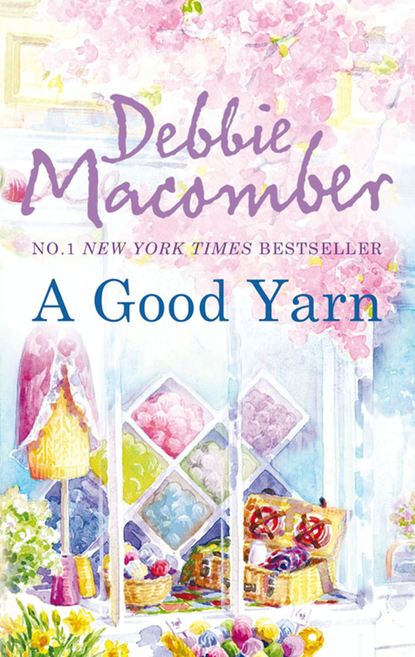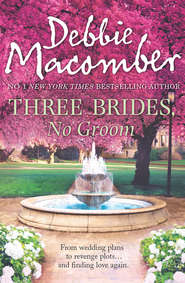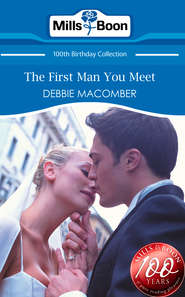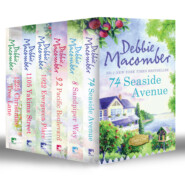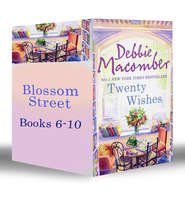По всем вопросам обращайтесь на: info@litportal.ru
(©) 2003-2025.
✖
A Good Yarn
Автор
Год написания книги
2019
Настройки чтения
Размер шрифта
Высота строк
Поля
“Next Sunday is Father’s Day,” Mom pointed out. “Will you take me to the cemetery? I’d like to put a vase of my roses on your dad’s grave.”
“Of course. Margaret and I will both come.” I was speaking out of turn and hoped my sister would agree to accompany us. She’d been so prickly and out of sorts lately. The closeness we’d briefly shared had evaporated like a shallow rain puddle in the sun. Whatever was wrong, she didn’t feel comfortable enough to share it with me, and frankly, that hurt. We’ve come a long way in our relationship, but it was situations such as this that reminded me how far we had yet to go.
As if the strength had gone out of her legs, Mom reached for a patio chair and sat down. Lifting the hat from her head, she wiped her forehead with one arm. “My goodness, it’s hot.”
I glanced at the temperature gauge my father had hung on the side of the house, and it read seventy-four degrees, which surprised me because it didn’t feel that warm. Of course, my mother had been working outside for at least an hour, more likely two.
“Would you like to go out for dinner, Mom?” I asked, thinking that would be a treat for us both.
“No, thank you, honey. I’m not hungry. I met Dorothy Wallace at the Pancake Breakfast the Knights of Columbus held after Mass and we ate our fill.”
Translated, she had one small pancake without butter or syrup, followed by a lunch of tuna and crackers, and she’d probably skip dinner altogether.
“Besides, Margaret phoned and she’s stopping by with the girls later this afternoon.”
Some of my worry left me. Margaret would make sure Mom had a decent meal at the end of the day.
“She enjoys working with you,” my mother continued. “She’s not one to say it, but she does.”
I wondered if I should mention my concerns about my sister. I decided against it, although Margaret had been weighing heavily on my mind since my conversation with Brad earlier in the week. There was no need to bring Mom into this. She’d certainly mention my concerns to my sister, and that would infuriate Margaret; she would resent me for discussing her with Mom, and then I’d hear about it for weeks.
“Can I get you anything?” I asked.
Her smile was distracted. “I’d love a glass of iced tea.”
I went inside and poured one for each of us, then added slices of lemon. Several other lemons had shriveled up and I tossed them without telling Mom. A quick look in the refrigerator had revealed a carton of milk a month past its expiry date and a package of liquefying spinach. I’d tossed those too. When I returned to the patio, Mom had replaced the hat and was sitting with her back to the sun.
I joined her and handed her the glass, savoring the warm sunshine against my skin, the sound of birds in the distance along with the swish, swish of the sprinkler watering the lawn.
“Tell me about the shop,” Mom suggested. “Did you get in any new yarn this week?”
She especially enjoyed the stories about my customers; so many of them had become my friends, especially Jacqueline, Carol and Alix, my original class members. We’ve created a real bond, the four of us, and it’s rare for me not to see them during the week. If nothing else, one or two always showed up for the charity knitting session on Fridays.
I talked nonstop for almost twenty minutes about the shop and described the three women who’d recently signed up for the sock class. The one who interested Mom most was Courtney Pulanski, the seventeen-year-old granddaughter of Vera Pulanski, a regular.
“I’m thinking of holding a potluck once a month,” I said, wanting her opinion on this new idea—partly to allow her to feel involved and partly because I trusted her instincts. Over the years, she’d been a valuable sounding board to my father in his businesses.
“Do you have room at the store?”
“I think so, if I do a bit of shuffling.” When I first opened my doors, there was room to set up a large table for classes, but as I’d brought in additional lines of yarn, much of that space had disappeared. Now the table, which sat six people, was surrounded by several displays.
“Are you sure you want food around all that yarn?”
My mother echoed my own reservations. “I thought we’d sit at the table where I hold my classes and put the food on a card table in the office.”
My mother raised one shoulder in a half shrug. “It might work, but what would be the purpose of these monthly potlucks?”
Good question. “Well, I want my customers to get to know one another. Plus, when one person shows the others what she’s knitted, it inspires them.” It was for this very reason that I often knit up patterns for display in the shop. “You could join us, Mom,” I said enthusiastically. “Margaret and I would love that.” As often as possible, I try to include her. Both Margaret and I work at giving Mom little things to look forward to so she feels active and alive.
From the way Mom frowned, I doubt she heard me. “Hold a monthly show-and-tell session and keep the food out of it. If you want to eat, go to a restaurant afterward.”
I liked that idea. “Thanks, Mom.”
I could tell she was pleased I’d come to her for advice. I’m sure it’s something she missed, since she’d so often taken that role with my father. We sat and chatted for another thirty minutes and then I left to meet Brad and Cody.
They were in the parking lot at Green Lake waiting for me, Chase tugging at the leash.
“Hi,” I called as I climbed out of the car. Chase wasn’t the only one eager for this outing.
Cody raced over to the car and briefly hugged me. “Can we go now?”
His father patted his head. “Okay, sport, but don’t get too far ahead of us, all right? And hold on to Chase.”
Cody didn’t take time to answer. He was off like a rocket, boy and dog together, Cody’s young legs pumping with an energy I envied.
Brad and I started walking at a brisk pace. As always on a sunny weekend day, the place was crowded with people and dogs. We passed a man with a guitar who sat on the grass strumming folk songs and a toddler chasing after a butterfly. There were a couple of canoes close to the shore. Brad and I walked side by side, keeping an eye out for Cody and Chase.
“How’s your mother?” he asked, knowing I’d spent part of the afternoon with her.
Right then, I didn’t want to launch into a long discussion about my anxiety over Mom. That conversation wasbest reserved for Margaret, and I’d initiate it soon. “She’s about the same,” I said, which was true enough. “My sister and the girls are visiting later today. Mom needs that.”
“Speaking of Margaret, has she said anything to you?”
“About what?” I asked cautiously.
Brad reached for my hand and we entwined our fingers. I smiled up at him, forgetting Margaret. It’s times like these, when we’re feeling close and connected, that I get lost in a sensation of such bliss I can barely contain myself. Like any woman, I hunger for love, marriage, a family. Because of the cancer, I didn’t think I’d ever have that chance. Every single day, I was grateful all over again for Brad, grateful to have him in my life, grateful to be loved by him despite my imperfections and flaws. He says the fact that I’ve battled cancer not once but twice makes me a two-time winner. I am a winner and I feel so incredibly blessed.
“I think I know what Margaret’s problem might be,” Brad said, jolting me out of my reflection.
“You do?” I was a little reluctant to talk about Margaret at the moment; I preferred to revel in my own contentment.
“Yeah. I ran into Matt at the hardware store yesterday afternoon,” Brad told me.
My brother-in-law is a salt-of-the-earth kind of guy. I consider him a good balance for my sister, who usually has a pessimistic slant on things. Matt doesn’t take life as seriously as she does. I find that he doesn’t overreact the way she tends to and—even more appealing—he never holds grudges.
“What did Matt have to say?” The four of us had gone out on occasion, and Brad and Matt had hit if off. Margaret invited us over for dinner a few months ago, and we’d played cards until the wee hours of the morning. I’d hoped to see more of them socially, but so far we hadn’t.
“He’s not working.”
“What do you mean, not working?” Matt had been with Boeing for as long as I could remember, probably twenty years.
“Not working as in he got laid off.”
“What? When?”
“Three months ago.”
“No.” That couldn’t be right. Three months? Margaret hadn’t said a word about this for three months? I was in shock.





